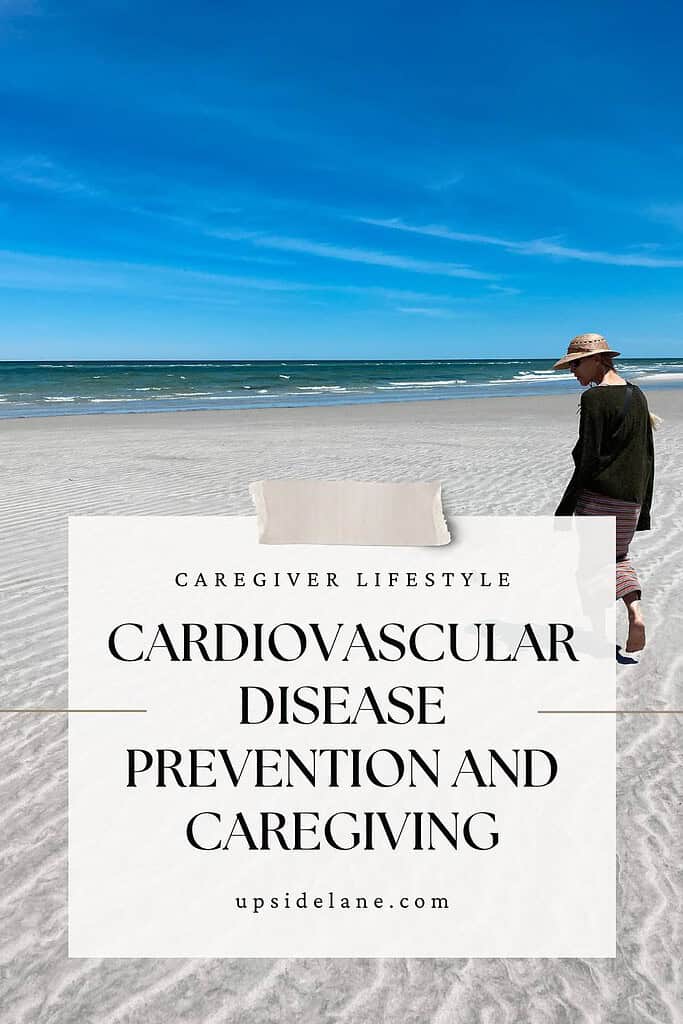Heart Disease Risk and Caregiving: 10 Self Care Tips
Understand the risks of heart disease associated with caregiving and learn how being a caregiver could impact your health, along with 10 self-care tips to help with risk reduction.

You may not realize it but heart disease risk and caregiving are closely linked, so it is important for us, as caregivers, to prioritize our own health, otherwise, we could face serious health issues down the road.
Practicing healthy self-care strategies regularly will help us be able to continually provide excellent care for the ones we love.
Being a family caregiver, although necessary and fulfilling, can sometimes be very stressful. This stress, if it becomes chronic, can take a toll on our cardiovascular health.
In this article, we will explore the often-overlooked connection between caring for loved ones and the increased risk for heart disease.
We will look at how the stress and demands of informal caregiving can impact our health and I will provide you with ten strategies to protect your heart while continuing to care for your loved ones.
Remember, taking care of yourself is not selfish, it is necessary for both you and for the ones you love.
Heart Disease: Increased Risk For Caregivers
Heart disease remains the leading cause of death globally, affecting millions of lives each year. It encompasses a range of conditions, from coronary heart disease to heart attack, stroke, and arrhythmias.
While traditional heart risk factors like high blood pressure, elevated cholesterol, and smoking are most familiar, the role of caregiving in heart health is less recognized but equally important.
Research suggests caregivers, particularly those providing long-term caregiving or intensive care – such as dementia caregivers, face a significantly higher risk of heart disease compared to non-caregivers.
This increased risk is due to the unique challenges family caregivers face, including physical health demands, chronic stress, and the tendency to prioritize their loved one’s needs over their own health.
The Hidden Toll Of Caregiving
The impact of caregiving on heart health is multifaceted. The constant worry, emotional stress, and physical exertion can lead to elevated stress hormones, increased blood pressure, and inflammation – all of which put caregivers at cardiovascular risk.
Caregivers often have little time for self-care activities such as regular physical activity, preparing healthy meals, or attending to their own needs, which include doctor appointments as well as medical treatment.
However, it is important to know that caregiving itself is not inherently harmful. The neglect of one’s own health in the process of caring for others is what causes the greatest risk.
This is why prioritizing personal care is so important. By incorporating self-care strategies into our daily routine, we, as caregivers, can significantly reduce our cardiovascular disease risk while providing quality care for the ones we love.

10 Self-Care Tips For Caregivers to Combat Heart Disease
To combat the risk of heart disease, here are 10 self-care tips we can easily incorporate into our daily routine.
1. Breathe
As a caregiver, when stress rises and the heart begins to race, or when we start to feel anxious and unable to cope, pause and take a deep breath.
This simple act is our first line of defense against the silent threat of heart disease, and it works quickly.
It is the very first self-care destresser tool I use as a caregiver for Doug who is managing Parkinson’s disease.
Deep, intentional breathing activates our body’s relaxation response, which lowers cortisol levels and brings blood pressure down. I liken it to hitting the reset button on your nervous system.
There are several breathing techniques you can use such as box breathing or diaphragmatic breathing. However, just a few mindful inhales and exhales can anchor you during moments of caregiver distress.
2. Shift Perspective
Shifting perspective is a powerful self-care tool that can transform our attitude when we are faced with challenging caregiving responsibilities. It is another technique to combat the risk of heart disease and caregiving.
When we shift perspective, the goal is to reframe our thoughts to view responsibilities in a more positive light. As an example, instead of thinking, “I have to take care of Mom today,” we shift to, “I get to spend time with Mom today.”
This simple change from “have to” to “get to” can powerfully impact our mindset. By consciously adjusting our viewpoint from negative to positive, we can alleviate stress and gain a deeper appreciation for our role as caregivers.
3. Stay Present
One of the biggest sources of stress for caregivers is getting caught up in thoughts of the past or worries about the future.
When we reminisce about the “good old days” before caregiving responsibilities began, it can lead to feelings of resentment or self-pity, which does not serve us.
Similarly, constantly anticipating future challenges can fill us with fear and dread, robbing us of peace in the present moment.
The healthiest approach is to stay present and to anchor ourselves in the here and now. By staying present, we can find fulfillment and be grateful for the beautiful moments we encounter each day.
This mindfulness practice helps us to appreciate the little things, including the meaningful interactions that occur on our caregiving journey every day.
As the Bible states in Matthew 6:34 (NLT), “So do not worry about tomorrow, for tomorrow will bring its own worries. Today’s trouble is enough for today.”
By focusing on the present we can manage stress, find moments of joy, and provide better care for ourselves and the ones we love.
4. Stretch
While stretching might not immediately come to mind as a strategy to help caregivers reduce heart disease risk, it actually is a powerful self-care tool.
Stretching increases blood flow throughout the body, which helps to release physical tension and, in turn, releases stress – a major contributor to heart disease.
Stretching doesn’t have to be a big deal, with an elaborate routine, especially if you are in the middle of challenging caregiving responsibilities.
Instead, focus on small, manageable stretches throughout the day. A gentle chest stretch to release anxiety while waiting for something to be done on the stove, or a quick calf stretch while standing in line waiting to pick up a medication at the pharmacy can make a big difference.
These brief moments of stretching can have a big impact on our overall well-being.

5. Turn the Tables
Turning the tables is a powerful exercise in empathy. It is about stepping into the shoes of the person you care for and seeing the world through their eyes.
Your care recipient more than likely never imagined they would be in a position where they needed help and support. They may be struggling with feelings of frustration, anger, or even guilt for needing help.
Mentally switching places shifts our perspective and helps us find more patience and compassion. This reminds us that caregiving isn’t just about physical needs but also about understanding and emotional support.
Turning the tables and practicing empathy can benefit the caregiver as well because it too is a form of self-care.
When we broaden our perspective, it may help us feel less resentful and/or overwhelmed. This helps us find a renewed sense of purpose and connection within the caregiver role.
6. Look Up
Looking up is a simple but powerful self-care strategy that can instantly shift our perspective and provide relief from the intense focus of caregiving.
When we pause and look up, it shows us there is a big world beyond our immediate circumstances. This can help us broaden our view when we feel trapped in our daily routine and challenges.
Looking up is a great strategy to help pull us out of our own little world. This reminds us that there is a much bigger world out there, more than just our life and the circumstances we live in.
This practice isn’t about escaping responsibilities but rather about putting things in perspective. Looking up can help us feel connected to something greater than ourselves.
It can offer comfort and help us realize we are not alone in our struggles. Everyone in their own way is facing challenges.
7. Dance, Shake, Wiggle
The simple joy of movement through dancing, shaking, or wiggling can be a surprisingly effective self-care strategy for caregivers.
This fun activity does more than just get our bodies moving, movement can be a powerful stress-buster that transforms our mood in minutes.
Movement, through either dancing or just standing and wiggling our body all over, helps to release tension and the physical release can greatly alleviate stress and anxiety, which serves as a natural mood booster.
There is something inherently liberating about letting our bodies move freely. For me, it almost always leads to laughter, either at myself, the situation. or just from the sheer joy of moving.
Caregiving and self-care don’t have to always be serious, sometimes the most effective strategies are the ones that make us laugh or bring a smile to our face.
8. Pet Your Pet
For caregivers who are fortunate to have a furry friend, spending time with your pet can be a powerful way to combat stress and nurture your own health.
Similar to the proven benefits of therapy animals, interacting with pets can bring about a sense of peace and calm, which helps to slow breathing and relax muscles, and worries seem to melt away for a time.
The unconditional love of a pet can provide an incredible amount of comfort, especially when we are feeling the pressure and demands of being a caregiver.
9. Write It Down
When your mind is running with thoughts and worries, one of the most effective ways to find calm is through journaling – writing it down.
For me, as I write things down, I notice a subtle shift. My racing thoughts begin to slow and worry seems to dissipate.
The act of writing is a form of release, which helps to unburden your mind and allow it to rest.
You may find after writing that solutions to problems become more clear and you are able to find your center more quickly.
10. Reach Out
As caregivers, when we are in the midst of stressful, challenging times, reaching out for help may feel like the last thing we want to do.
Sometimes we can get so caught up in our daily chores, errands, and putting out fires that we don’t feel we even have the time to pause and ask for help.
It is important to reach out for support before a crisis hits, or before it’s too late, and we are in a heap of tears on the couch.
Working on building a strong support system for ourselves as caregivers is important. It may take time to build a supportive network but it is well worth the investment, for the future of our well-being including reducing the risk of heart disease as a caregiver.

Heart Disease Risk: Address Common Caregiver Stressors and Challenges
To combat heart disease risk as a caregiver, it is important to be aware of common stressors and challenges we can experience while taking care of our loved ones and while on the caregiver journey.
Here are a few potential stressors to keep in mind and to actively try to get ahead of and manage.
- Financial strain. Via additional expenses, being unable to work outside the home, or other unforeseen financial constraints. It is important to not ignore your financial situation and to work out a plan for the future. Seek professional assistance from a financial expert if need be.
- Time management difficulties. There are only 24 hours in a day with what seems to be too many things on the “To Do” list to get done. Be gentle with yourself, don’t beat yourself up if there’s stuff left on the list. Be okay with letting it overflow into the following day, week, or month!
- Compassion fatigue. Sometimes when we go, go, go, losing compassion or empathy for our loved ones is a risk. Keep ahead of it and reach out for support.
- Sleep deprivation. Whether your sleepless nights are because you are experiencing anxiety or worry, or your lack of sleep is due to having to care for your loved one in the middle of the night, sleep deprivation is a common stressor. Aim to stay ahead of this as best you can, and make it a priority to develop a quality sleep hygiene program.
- Personal relationships neglect. It is common to put our loved one’s needs ahead of our own, however, taking time to feel encouraged and loved by the supportive relationships in your life is a necessity and an important part of self-care.
- Work-life balance. Due to the demands of being a caregiver, work-life balance can get disrupted. It is important to continually advocate for yourself by developing a healthy work-life balance, including leisure activities that work for you as a caregiver.
Potential Signs and Symptoms of Heart Problems
Recognizing the signs and symptoms of a potential heart problem is crucial as early intervention can prevent serious health complications. Here is a list of potential heart issue symptoms.
- Chest pain or discomfort
- Shortness of breath
- Heart palpitations or irregular heartbeat
- Dizziness or lightheadedness
- Fatigue or weakness
- Swelling of the legs, ankles, or feet
- Nausea or cold sweats
It is important to stay vigilant and never ignore these warning signs, as timely action could be life-saving. Seek medical attention immediately if you begin to experience any of these symptoms.
Staying healthy and reducing our risk for heart disease is not only important for our own well-being but also so we can continue to provide quality care for the ones we love.
The Ripple Effect
When caregivers prioritize their own well-being, it becomes a win-win situation for everyone.
By practicing self-care, and reducing the risk of heart disease, caregivers not only protect their good health but also enhance the quality of the care they provide.
The long-term health benefits for caregivers are also great. Regular self-care can greatly reduce the risk of depression, burnout, and stress-related chronic diseases, including heart disease.
As caregivers, when we invest in our health, we are better able to sustain the caregiver role over time and support our loved ones well while also maintaining our vitality and well-being.
FREE Helpful Caregiver Resource Guide
Protecting The Heart While Caring For Others
Caregiving is a journey of love and dedication but it is not always easy. As caregivers, we spend a lot of time looking after our loved ones while sometimes forgetting to take care of ourselves.
Selflessness, as beautiful as it is, can put our own hearts at risk.
Let’s make sure to extend some of that wonderful care back to ourselves, and find a place where we can take care of both our loved ones and our own well-being.
When we look after our own heart health, we will be making sure we can be there for our loved ones, stronger, longer, and with gratitude.
Additional Articles To Enjoy
- The Best Caregiver Gifts – From A Care Partner’s Perspective
- Caregiver Burnout: Caring For Yourself Under Stress
- 5 Simple Dumbbell Exercises: Full Body Beginner Workout
- You Are Important: 20 Reasons Why Caregivers Matter
- The Healthiest Fiber-Rich Cereals For Breakfast
Additional Support For Caregivers
Let’s Connect
I hope you found this article on heart disease risk and caregiving helpful.
Caregiving is such a necessary and beautiful vocation but it is not always easy. The risk for heart disease among caregivers is real, and it is something we all need to be mindful of.
It is important to remember, however, that it’s not the caregiving specifically that poses the risk but rather the tendency for the caregiver to neglect their own health along the way. We must, and can, do both, it just takes awareness and a little bit more effort.
QUESTION: What are some healthy activities you do to take care of your heart, and to minimize the risk of heart disease?
Let me know in the comment section below, I would love to hear from you.
Also, please consider sharing this article with friends and family, or anyone you feel would find it beneficial.






